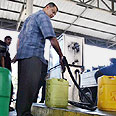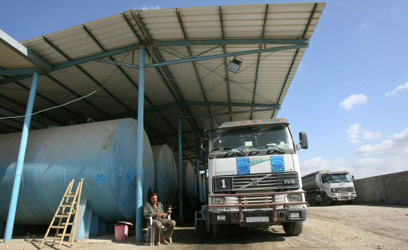
Report: Israel reduces fuel supplies to Gaza
Senior Palestinian official says Jewish state dramatically limited fuel supplies to Strip on Sunday after threatening to impose sanctions in response to rocket attacks from impoverished Hamas-ruled territory. Israel denies report, says measure has not yet been implemented
But Israel, whose defense minister, Ehud Barak, gave a green light last week for cuts to Gaza's fuel and electricity supplies, said the measure had not yet been implemented.
Mojahed Salama, head of the Palestinian Authority's Petrol Agency, said Sunday's fuel imports showed a 40 to 50 percent reduction in diesel and benzine supplies and a 12 percent reduction in fuel for Gaza's power plant.
"We sent the supplying company the same daily requests but they said they were sorry and that because of the new imposed sanctions they could only send us a reduced quantity," Salama told Reuters.
Gaza's power plant received a full supply of fuel on Sunday, officials with the European-funded fuel supply program said.
"The plant received the full amount for today. It was delivered," said a senior European Union official involved in overseeing the program. The EU pays for all of the fuel supplied to the Gaza power plant and oversees each delivery.

Truck waiting for fuel supplies in Gaza City (Photo: AFP)
Israel denied imposing cutbacks on fuel supplies to Gaza.
"No instructions have been received from the defense minister, and therefore there have not been any cutbacks," said Captain Shahdi Yassin, spokesman for the Israeli Defense Ministry office that liaises with the Palestinian Authority.
Defense establishment officials said that the first reduction of the benzine supplies was expected on Tuesday, and that there would be a negligible reduction in the supply of diesel fuel.
Security sources said that "the Palestinians will feel the different within a week, not immediately. Most houses own generators, and when the amount of benzine is limited, civilians will be forced to choose between driving a car and filling the generator."
In the coming days Israel is also expected to close the Sufa crossing, which is used for the transfer of goods to the Gaza Strip. The terminal is also being closed for security-related considerations, as the number of warnings against terror attacks in the area has recently increased.
In such a situation, the goods will only be transferred through the Kerem Shalom crossing, and only food and medications will be let in. Other goods, such as textile, tobacco and office supplies will remain outside the Strip.
Israel to announce blackout
On Thursday, Defense Minister Barak approved reducing Israel's power supplies to the Gaza Strip.
Security sources explained that the decision was not part of punishment measures, but rather an implementation of Israel's gradual disengagement from Gaza following Hamas' takeover of the Strip.
As part of this decision, Israel does not plan to cut the power supply following in response to each rocket fired at Israel, but it was decided to gradually reduce the Strip's dependency on Israel in order for the electricity supplied to be used by the Palestinian population rather than for terror purposes.
Israel has yet to decide how to implement the power cuts. Security sources noted that this would entail informing the Palestinians on the blackouts in advance through local media outlets.
About 70% of the power supplies to the Strip come from Israel, 25% are manufactured by the Palestinians, and the rest, about 5%, come from Egypt. Israel will not reduce the supplies of diesel fuel into Gaza, as it used by essential institutions such as hospitals.
The Gaza power stations will continue to receive fuel oil, but the supply of petrol used for domestic purposes will be limited.
"The Palestinian civilian will have to decide whether to drive his car four times a week or only three. This does not constitute humanitarian damage," a security source said.
Israel says it is seeking non-violent ways of pressuring Hamas, an Islamist group that seized control of Gaza in a June civil war, to stop cross-border rocket salvoes by Palestinian gunmen.
The United Nations has told Israel it must not inflict collective punishment by denying vital supplies to Gaza's 1.5 million residents.
Israel quit Gaza in 2005 after 38 years of occupation but continues to control its borders.










